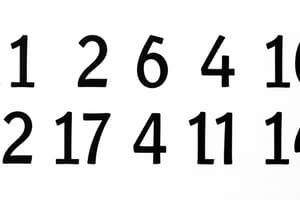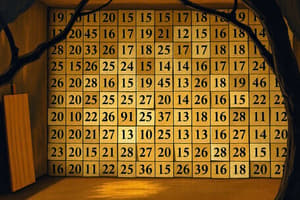Podcast
Questions and Answers
What can be inferred if 45 is a multiple of 9?
What can be inferred if 45 is a multiple of 9?
- 9 is a factor of 45. (correct)
- 45 is a factor of 9.
- 45 is a prime number.
- 9 and 45 are both composite numbers.
What is the first non-zero multiple of 6?
What is the first non-zero multiple of 6?
- 0
- 18
- 6 (correct)
- 12
Why are there infinite multiples of any integer?
Why are there infinite multiples of any integer?
- Because integers can only multiply by even numbers.
- Because integers can only be multiplied by 1.
- Because integers can be multiplied by an increasing count of integers. (correct)
- Because integers have a limited amount of factors.
What is the smallest multiple of 8 that is greater than or equal to 8?
What is the smallest multiple of 8 that is greater than or equal to 8?
Which statement correctly describes every integer's relationship with the number 1?
Which statement correctly describes every integer's relationship with the number 1?
What is the first non-zero multiple of 5?
What is the first non-zero multiple of 5?
In a time-driven scheduling system where tasks execute every 12 seconds, when will the first four executions occur?
In a time-driven scheduling system where tasks execute every 12 seconds, when will the first four executions occur?
If a data logger records data every 3 minutes, which times represent the first five recordings?
If a data logger records data every 3 minutes, which times represent the first five recordings?
Which of the following statements correctly describes a factor?
Which of the following statements correctly describes a factor?
In regards to multiples, which statement is true?
In regards to multiples, which statement is true?
Study Notes
Properties of Multiples
- An infinite number of multiples exists for any integer due to continual multiplication by increasing integers.
- Multiples of a number are always greater than or equal to that number, with 0 being a special multiple of any integer.
- Every number is a multiple of 1, as any number multiplied by 1 yields the number itself.
- If B is a multiple of A, then A is a factor of B, demonstrating the interrelation of factors and multiples.
Examples and Practice Questions
- The first non-zero multiple of 7 is 7.
- If 36 is a multiple of 6, it implies that 6 is a factor of 36.
- The smallest multiple of 8 that is greater than or equal to 8 is 8.
- Multiples of 5 are infinite because you can multiply it by any integer to yield unique products.
Applications of Multiples
- Time-driven scheduling systems use multiples for periodic tasks, such as executing a task every 3 seconds, resulting in activities at 3, 6, 9 seconds, etc.
- Email applications might check for new messages every 15 minutes, running tasks at intervals like 15, 30, and 45 minutes.
- Data collection in a sensor network can occur every 5 minutes, resulting in actions at 5, 10, 15 minutes, and so on.
First Non-zero Multiples
- The first four multiples of 7 are 7, 14, 21, and 28.
- The first six multiples of 4 are 4, 8, 12, 16, 20, and 24.
- The first five multiples of 9 are 9, 18, 27, 36, and 45.
Multiples of an Integer
- A multiple of an integer n is expressed as n × k, where k is an integer.
- Examples include multiples of 5: 5, 10, 15, 20, etc., and multiples of 8: 8, 16, 24, 32, etc.
Properties of Factors
- Factors of a number are always less than or equal to that number.
- Every number has at least two factors: 1 and the number itself.
- Understanding factors is essential for divisibility and simplifying complex problems.
Practice with Factors
- Possible factors of 18 include 2; 20, 19, and 25 are not factors.
- Factors are always less than or equal to the number, unlike other types of numbers.
- Factors of 12 include 1, 3, 12, but 15 cannot be a factor.
Finding Multiples
- To find multiples of a number n, start from 1 and check for divisibility with decreasing integers.
Studying That Suits You
Use AI to generate personalized quizzes and flashcards to suit your learning preferences.
Description
Explore the concept of multiples with this quiz that delves into the infinite nature of multiples for any integer. Understand why every number is a multiple of 1 and the special case of zero as a multiple. Test your knowledge and comprehension of these fundamental mathematical principles.




